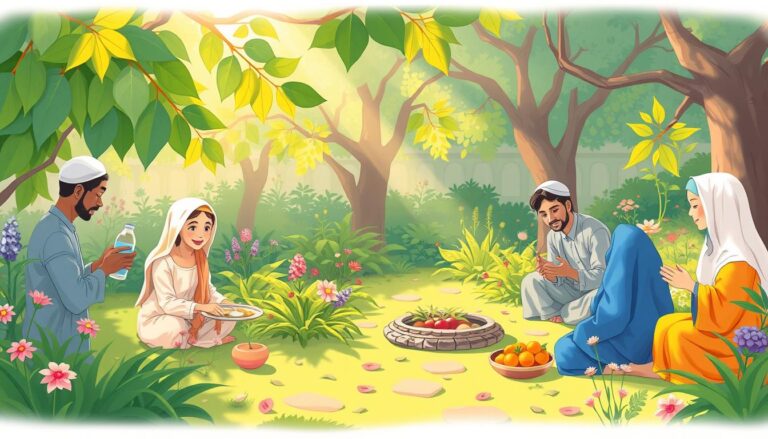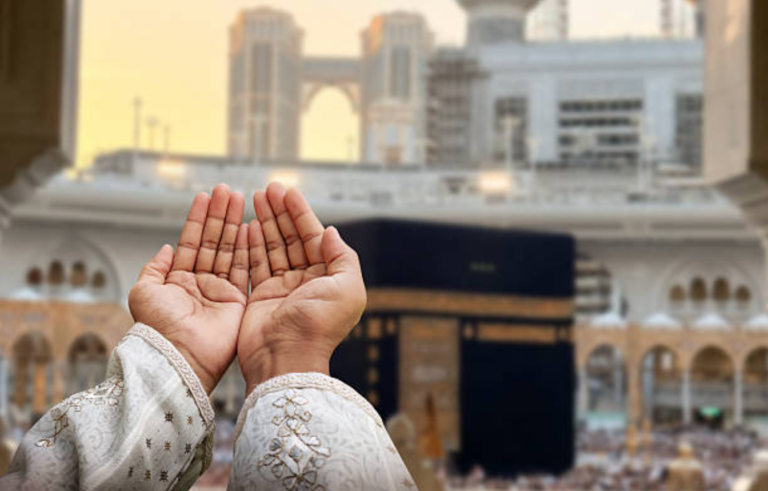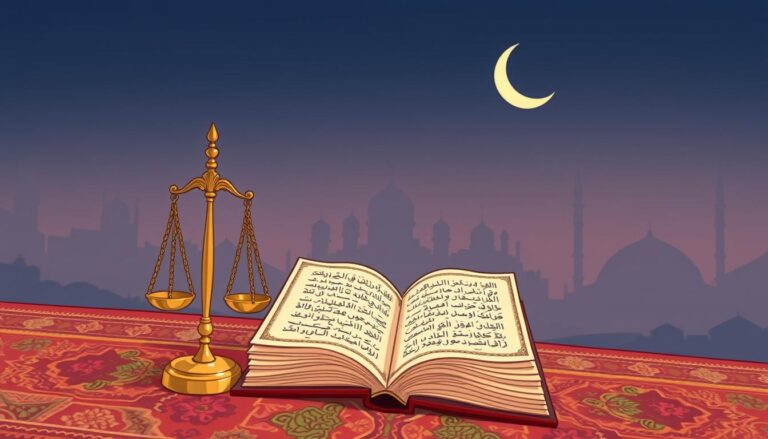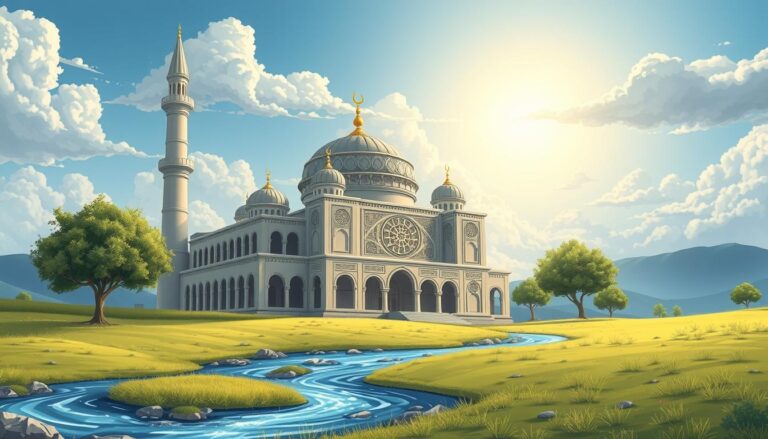Paradise and Hell in Islam: A Look at the Hereafter
Ever thought about what comes after we die? In Islam, Paradise (Jannah) and Hell (Jahannam) are key to understanding the afterlife. These ideas shape how Muslims live and show the religion’s views on justice and morality.
The Quran talks about Jannah 147 times, showing its importance. Paradise and Hell have levels, with rewards or punishments. The afterlife is seen as physical, psychic, and spiritual, giving a full picture of what’s to come.
Islamic teachings vividly describe Paradise and Hell. Paradise is said to have rivers, milk, wine, and honey, with fruits for all. Believers will wear silken clothes, sit on raised thrones, and be free from pain. Hell, however, is a place of torment, meant to scare people into good behavior.
The afterlife belief guides Muslim actions and morals. It pushes for self-reflection, doing good, and following Islamic rules. The hope of Paradise and the fear of Hell motivate believers to live righteously, giving them purpose and accountability.
Key Takeaways
- Paradise and Hell are central concepts in Islamic eschatology
- The Quran mentions Paradise (Jannah) 147 times
- Both Paradise and Hell have multiple levels
- Afterlife experiences are described as physical, psychic, and spiritual
- Beliefs about the afterlife shape Muslim behavior and ethics
- Paradise is described as a place of eternal bliss and rewards
- Hell serves as a deterrent for immoral behavior
Understanding Islamic Eschatology
Islamic eschatology is a key part of Islamic theology. It looks at the end times and afterlife. This shapes beliefs and moral accountability. The idea of the afterlife in Islam motivates good behavior and gives hope to believers.
The Concept of Afterlife in Islam
In Islamic teachings, the afterlife is not just a future place. It exists alongside our world today. Muslims see Paradise and Hell as real places that touch Earth before the Day of Judgment.
Key Terms in Islamic Eschatology
To understand Islamic eschatology, you need to know some important terms:
- Jannah: The Islamic paradise
- Jahannam: The concept of Hell
- Yawm al-Qiyamah: The Day of Judgment
- Mahdi: A messianic figure
- Dajjal: The false messiah
The Importance of Belief in the Hereafter
Belief in the hereafter is central to Islamic faith. It guides moral accountability and shapes Muslim life and society. This belief encourages living righteously and offers comfort in life’s challenges.
“Paradise and Hell in Islam: A Look at the Hereafter” is considered the most comprehensive work on Islamic eschatology, inspiring further research and discussions on afterlife concepts in Islam.
Jannah: The Islamic Concept of Paradise
Jannah is the Islamic paradise, a reward for those who live righteously. It is mentioned 147 times in the Qur’an, showing its importance. Here, believers will find spiritual rewards and divine pleasure.
The Qur’an vividly describes Jannah’s beauty. It talks about lush gardens and rivers of water, milk, wine, and honey. These symbols represent the purity and abundance that awaits the faithful. Even Prophet Muhammad mentioned a river of hollow pearls, adding to its beauty.
Jannah offers more than just physical pleasures. The greatest reward is Allah’s pleasure and mercy, more valuable than anything on earth. Believers will be with prophets, martyrs, and other virtuous souls, creating a community of eternal peace and happiness.
“Indeed, those who have believed and done righteous deeds – they will have the Gardens of Paradise as a lodging.”
To enter Jannah, one must have faith and perform good deeds in life. The Qur’an highlights qualities like kindness, compassion, and strong belief in God. This promise of eternal bliss motivates Muslims to live virtuous lives, aiming for a place in paradise.
Jahannam: The Islamic Concept of Hell
In Islamic theology, Jahannam is the place of punishment for those who don’t believe or do wrong. It’s a key part of teaching moral accountability in the faith. The Quran describes Jahannam as a place of great suffering, showing God’s justice.
Descriptions of Jahannam in Islamic Texts
Islamic texts vividly describe Jahannam. It’s seen as a huge place with seven levels, each worse than the last. The Quran says it’s filled with fire, mountains, rivers, and oceans of foul liquids. These images remind us of the bad outcomes of living wrongly.
Levels of Punishment in Hell
The punishment in Jahannam depends on the sins done. Islamic teachings say the torments are physical, mental, and spiritual. The Quran talks about skin feelings, endless thirst and hunger, and other tortures. These punishments show how serious our actions are and why we should live right.
Temporary vs. Eternal Inhabitants of Jahannam
How long the punishment in Jahannam lasts is debated among scholars. Most think it’s forever for those who don’t believe. But some say some sinners might be freed. This idea shows the balance between God’s justice and mercy in Islamic thought.
“Every soul will taste death. And We test you with evil and with good as trial; and to Us you will be returned.”
The Day of Judgment in Islamic Theology
Yawm al-Qiyamah, or the Day of Judgment, is a key part of Islamic beliefs about the afterlife. It’s when all souls face divine justice for their actions on Earth.
Islamic texts vividly describe this day. The Quran talks about it 70 times, using names like Al-Qari’ah and Al-Zalzalah. These names show its importance in Islamic beliefs.
On this day, a trumpet sounds, starting cosmic events. The Earth shakes, mountains fall, and all life stops. Then, souls are judged. Each person’s actions are weighed on a divine scale.
“Every soul will taste death. Then to Us will you be returned.” – Quran 29:57
The outcome decides one’s eternal fate. The good go to Jannah (Paradise), and the bad to Jahannam (Hell). This belief guides Muslim life and ethics.
- The term “as-sa’a” (The Hour) appears 39 times in the Quran
- Key events: resurrection, gathering, judgment, final consignment
- Belief shared with other Abrahamic faiths
Understanding Yawm al-Qiyamah gives insights into Islamic views on justice, morality, and life’s purpose. It highlights the faith’s focus on personal responsibility and living ethically.
Quranic Descriptions of Paradise and Hell
The Quran vividly describes Jannah (Paradise) and Jahannam (Hell). These images motivate believers, showing divine justice in the afterlife.
Physical Pleasures of Jannah
Jannah is a place of unmatched beauty. The Quran talks about rivers, gardens, and eternal youth. It also says 1 in 55 verses hint at pleasures we can’t fully understand.
Spiritual Rewards in Paradise
Jannah offers more than just physical delights. Believers will find Allah’s presence and perfect peace. The Quran says in 32:17 that these rewards are for the faithful, showing their greatness.
Torments and Sufferings of Jahannam
Jahannam is a place of severe pain. The Quran mentions fire, boiling water, and other torments. It’s mentioned 77 times, showing its importance in Islamic beliefs.
- Hell-Fire is described as 69 times hotter than worldly fire
- It’s said to be brought forth with 70,000 Zimaam, each pulled by 70,000 Angels
- The sound of Hell-Fire is described as furious and rageful
These detailed descriptions of Paradise and Hell guide believers. They emphasize the importance of living righteously, based on divine justice.
Salvation and Entry into Paradise
Islamic beliefs say you can reach salvation by believing and doing good. The Quran guides us on how to get to Paradise. It shows how important it is to be morally accountable on this journey.
Criteria for Salvation in Islam
Getting saved in Islam depends on what you do and believe. The Quran says in 2:25, “Give glad tidings to those who believe and do good deeds, that they will have gardens beneath which rivers flow.” This verse shows faith and good actions are key.
- Belief in Allah and His teachings
- Performance of good deeds
- Adherence to moral principles
The Fate of Non-Muslims
The fate of non-Muslims is a complex topic. Some think only Muslims can be saved. But others point to verses that talk about Allah’s justice and mercy.
Intercession and Divine Mercy
In Islam, there’s a belief in intercession and divine mercy. The Prophet Muhammad’s help is seen as a way for sincere believers to get into Paradise. This fits with the Quran’s message of Allah’s kindness to those who seek His favor.
“Those who dedicate themselves to seeking the pleasure of Allah are shown compassion by God Almighty.”
Grasping these ideas about salvation can deeply affect a Muslim’s life. It encourages a focus on being morally responsible and growing spiritually. This pursuit aims for divine justice and eternal reward.
The Role of Angels, Jinn, and Devils in the Afterlife
Islamic theology vividly describes spiritual beings in the afterlife. Angels, jinn, and devils have unique roles, shaping souls’ experiences after death.
Angels act as guides in Paradise, welcoming the faithful. The Quran calls them pure and obedient to Allah’s will.
Jinn, like humans, face judgment after death. Those who lived righteously may enter Paradise. Others face punishment. This shows Islam’s belief in free will and accountability.
Devils, including Iblis (Satan), are forever banned from Paradise. They try to tempt and mislead souls. Muslims seek protection by reciting certain Quranic passages.
“There is no God except Allah, Muhammad is the messenger of Allah.”
This statement, the Shahada, is Islam’s first pillar. It’s a key to salvation, affirming belief in Allah and His Prophet. It guides Muslims towards Paradise, away from devils.
Knowing about these spiritual beings helps Muslims live with awareness and devotion. They strive for a good outcome in the afterlife.
The Impact of Afterlife Beliefs on Muslim Life and Society
Islamic culture is deeply influenced by beliefs about the afterlife. One quarter of the Qur’an’s verses relate to life after death. This shows its importance in shaping moral accountability. Muslims recite Surat al-Fatihah, which emphasizes the Day of Judgment, at least 17 times daily. This constant reminder drives ethical living and shapes daily choices.
The promise of Paradise and the fear of Hell serve as powerful motivators in Muslim communities. Studies show that Islamic spirituality and intrinsic religiosity are linked to higher levels of death anxiety among Muslims. This awareness of the afterlife encourages good deeds and discourages harmful actions, fostering a society focused on righteousness.
Belief in the Hereafter impacts Muslim mental health and well-being. Research indicates that faith in a loving God and Paradise is tied to higher self-esteem, life satisfaction, and happiness. These beliefs provide comfort during life’s challenges and inspire hope. They also influence Islamic art and literature, reflecting the culture’s deep connection to afterlife concepts.
In Muslim societies, the doctrine of social service is integral. The Qur’an criticizes hoarding wealth without helping the poor, viewing it as a cause of societal decay. This belief in accountability in the afterlife motivates charitable actions and ethical business practices, shaping the moral and social fabric of Islamic communities.
Source Links
- PARADISE AND HELL | CPS GLOBAL
- Paradise in Islam – Read the wonders awaiting in Heaven
- Degrees and Levels of Paradise and Hell – Islam Question & Answer
- Islamic eschatology
- Paradise and Hell in Islamic Traditions
- Roads to Paradise: Eschatology and Concepts of the Hereafter in Islam (2 vols.)
- Jannah
- Concept of Heaven and Hell according to Islam – Islamic Articles
- Jahannam
- Hell – Islamic Beliefs, Afterlife, Judgment | Britannica
- The Book Giving Description of the Day of Judgement, Paradise and Hell (Kitab Sifat Al-Qiyamah wa’l Janna wa’n-Nar)
- Judgement Day in Islam
- Quran-Islam.org – True Islam
- Paradise and Hell
- Salvation, Heaven, and Hell: The Qur’anic Viewpoint
- The Hereafter
- No title found
- Seven Stages of Life in Islam
- A Glance at Paradise and Hell
- The Relationship Between Afterlife Beliefs and Mental Wellbeing Among Jordanian Muslim Youth
- The Life of this World and the Hereafter (1.4 Islam)
- Islam – Eschatology, Judgment, Afterlife | Britannica







